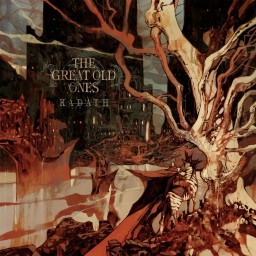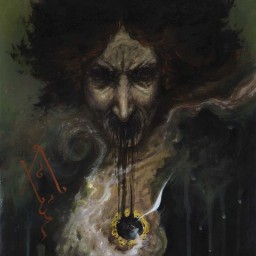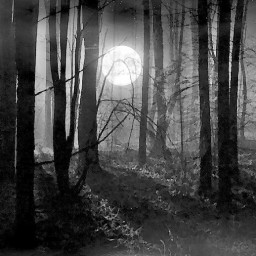Reviews list for Great Old Ones, The - Kadath (2025)
I will confess to have been on the fence with The Great Old Ones for some time. I do not recall ever sitting down and giving anything of theirs to date a critical listen before spending a few hours with Kadath though, so I am unsure where this standoffishness came from. Picking up on some of the references to latter day, more progressive Enslaved did have something to do with it, I think. I am not progressive metal’s biggest fan, and so the prospect of having to follow such a trail (or trial as I often find progressive metal to be) did not bode well. However, on reflection, having listened through to the record multiple times, the progressive elements are a lot more subtle than I first feared. They represent a well balanced and unintrusive character in proceedings. Even at its most obvious the progression is not complex or jarring and so I find it more than palatable.
The fact is that I enjoy Kadath a lot more than I was expecting to. I have gotten into the habit of getting in bed at a reasonable hour and taking some bedtime listening with me. Kadath was my bedtime listen last night, and I completed a further run through this morning before work. These two more critical listens, done without the distractions of screens or work, proved to be key in my development of understanding the record better. For a start, it struck me that the three guitars are used intelligently and are not allowed to overwhelm tracks. In fact, they fill up space that would otherwise go unused, in the sense that if two of them are maintain the often-powerful rhythm of many tracks then melodies and atmospherics are done by the third guitar in the background, on the periphery of the main drivers of tracks or in the upper stratosphere of some of the more expansive moments on songs. Cleverly, they do this without creating any distractions. All three instruments fit together so well.
I hear little, if not any, synths or keys on the album either. Considering the nature of the music, this is surprising. The fact that I can be entertained by a fifteen-minute instrumental track, that I would normally hate, is testimony to how good the band are at creating atmosphere and tension using just strings and percussion. The only disappointment around the instrumental is the track prior to it. ‘The Gathering’ must hold some purpose from a narrative perspective as it does little else other than act as an intro for the instrumental. I just find this an odd arrangement choice.
Going back to that earlier Enslaved comparison. If I benchmark Heimdal against Kadath, then it is the latter that I hold in much higher regard. The comparison is most definitely relevant and justified but the French outfit here are far more entertaining and stronger sounding (which I grant is largely down to the third guitar). ‘In the Mouth of Madness’ has an almost epic heavy metal feel to the opening of the song and chaotic riffs of ‘Those from Ulthar’ are backed by wonderful percussion and those grim vocals superbly. This is top three material in the black metal release of the year so far and may supplant Grima for second spot with further listens. I should have perhaps taken more notice of TGOO before now.
I have been a big fan of the Lovecraft-obsessed Frenchmen since the release of their sophomore, Tekeli-li, back in 2014. They have always imbued their atmospheric black metal with post-metal and even atmo-sludge elements to add an additional emotional redolence to their tales of eldritch horror. Whilst this latest follows a similar template, the band are also moving in a generally more progressive direction, as exemplified by the ten-minute opener, "Me, the Dreamer" and even more pertinently by the lengthy instrumental "Leng". "Me, the Dreamer" begins in TGOO's recognisably dense atmospheric black metal style, but at midpoint it takes an even more menacing turn, introducing an air of dissonance that sees it covering similar territory to that heard recently on Ulcerate's "Cutting the Throat of God", before making a more triumphal-sounding procession to song's end. The fifteen minutes of "Leng" exhibits even more musical turns, being an epic piece that expresses the faded grandeur and looming menace of long-forgotten and abandoned alien cityscapes better than any amount of words could. This track in particular, without it's reliance on the human voice, reveals how adept the band are becoming at writing metal that can convey atmosphere and mood by instrumentation alone and is a seminal piece for the band. The three guitarists weave in and out of each other with wistful and lighter motifs alongside hulking and towering, darker riffs making this a beautifully constructed and expressive instrumental.
Not only on those two tracks, but throughout it's hour-long runtime, Kadath sounds more ambitious than the band's previous material and feels like a band stretching their wings, having grown more confident in their technical abilities and reaching for more tools to utilise in their quest to produce music that fully conveys the dark and ominous concepts of the Cthulhu Mythos around which they base their ethos. They have always produced epic-sounding black metal, but their new-found confidence in their ability to expand their sound has taken this to a new level, with increasingly light and dark shades contrasting each other to deepen the otherworldly atmospherics. This isn't by any means a sea-change in the frenchmen's sound, but rather an evolution in the way they express themselves, I guess in a similar way that Enslaved successfully managed on their releases during the 2000s. Like the Norwegians TGOO are unafraid to sometimes take a slightly more melodic route with several of their riffs proving to be decidedly hooky, the opening riff of "Under the Sign of Koth" for example, being a particular foot-tapper.
All this has not come at the expense of any inate heaviness, it must be pointed out. Well, maybe a little, but I think that the more reflective moments often serve to throw the heavier sections into even sharper relief and render them consequently more effective. Look, Kadath is not exactly the kind of album you would put on to work out some aggression or for a good headbanging session, but that doesn't mean that it can't shake the foundations occasionally and it possesses enough sonic gut-punches to appeal to any number of discerning metalheads. But that ultimately isn't the aim of the album, it is for reflection and contemplation of the unknown corners of the human psyche and the barely concealed horrors lurking therein, to which end it is reasonably successful, I would suggest.


 Vinny
Vinny
 Sonny
Sonny